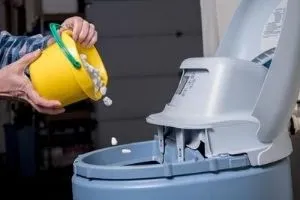Which Water Softener Is Best?
There are a few different water softeners that are sold on the market today. Of all the different options, it really comes down to either a salt-based water softener or a salt-free water softener.
Each type of water softener has its pros and cons, but above all, it is important simply to have one installed in the first place. Water softeners are always a good idea because they not only ensure homeowners have the best tasting water possible, but they protect the piping system as well.
Water Softener Benefits

When it comes down to it, homeowners really can’t go wrong with installing a water softener in their homes.
The benefits are seemingly endless, including:
- They won’t have water stains on dishes any longer
- Their hair and skin will feel softer
- It won’t take a lot of soap to clean fixtures
- Piping systems and appliances will last longer
- Higher property value
Not only will they experience all of these benefits, but they should even start to see an increase in their overall health.
When investing in a water softener, homeowners can trust that the water supply is getting softened right as it enters the home. The water is either treated by adding salt to the water or by using a salt-free method.
Learning About Salt-Based Water Softeners

The salt-based water softeners treat the water via a resin bed. This resin bed filters out the calcium and magnesium that makes water hard and replaces them with salt. It is important to maintain a clean filter in the water softener because if the filter isn’t cleaned, the water softener can’t do its job properly. Not only that, but it could damage or break the water softener as a result.
Some pros of salt-based water softeners are:
- It does a great job at completely removing the minerals that make water hard
- It makes water noticeably softer to the touch
- Keeps appliances working efficiently longer
- Reduces lime build-up in sinks and drains
Some cons of salt-based water softeners are:
- They are more expensive than salt-free systems
- It requires more maintenance as well
Discussing Salt-Free Water Softeners
The main difference between the two water softeners, other than the lack of salt, is the fact that there is no ion exchange at all with a salt-free water softener. Rather, the water is treated through another medium via a process known as Template Assisted Crystallization (TAC). Essentially, they are water conditioners instead of water softeners because they condition the water, they do not remove the impurities from the water.

Some pros of salt-free water softeners are:
- They are more affordable
- It doesn’t waste as much water
- It doesn’t require chemicals to treat the water
- It counteracts the minerals rather than removing them
Some cons of salt-free water softeners are:
- It doesn’t remove impurities, it only conditions them
- The water doesn’t feel as soft to the touch
- There might not be a build-up in pipes, but there will still be some impurities in the water
- It takes longer to show results because it runs on electricity rather than using salt
About Hall's Plumbing
When homeowners are having plumbing issues, look no further than the professionals at Hall's Plumbing. They offer flat-rate pricing and a 100% satisfaction guarantee that they can trust. Regardless of the plumbing issues, the experts at Hall's Plumbing will get the job done right the first time and at a price everyone can agree on.

